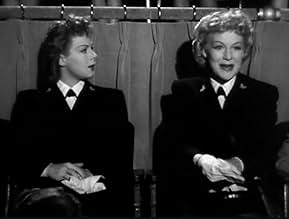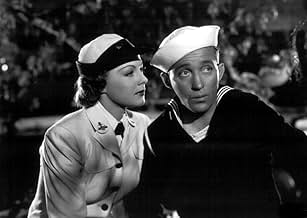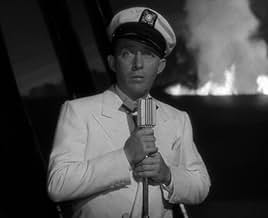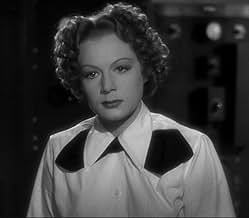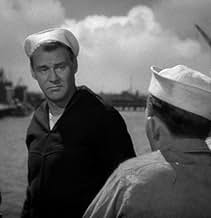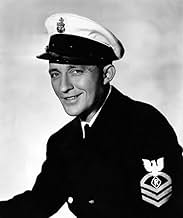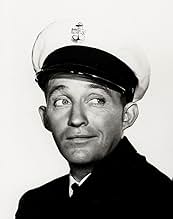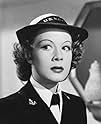Le gemelle del mondo dello spettacolo Rosemary e Susie, una seria e l'altra perversa, si uniscono ai WAVES ed entrambe si innamorano del crooner Johnny Cabot.Le gemelle del mondo dello spettacolo Rosemary e Susie, una seria e l'altra perversa, si uniscono ai WAVES ed entrambe si innamorano del crooner Johnny Cabot.Le gemelle del mondo dello spettacolo Rosemary e Susie, una seria e l'altra perversa, si uniscono ai WAVES ed entrambe si innamorano del crooner Johnny Cabot.
- Regia
- Sceneggiatura
- Star
- Candidato a 1 Oscar
- 1 candidatura in totale
Anabel Shaw
- Isabel
- (as Marjorie Henshaw)
Terry Adams
- Wave
- (non citato nei titoli originali)
Harry Barris
- Bandleader
- (non citato nei titoli originali)
Carmella Bergstrom
- Wave
- (non citato nei titoli originali)
Lillian Bronson
- Johnny Cabot Fan
- (non citato nei titoli originali)
Charles D. Brown
- Capt. Johnson
- (non citato nei titoli originali)
Mae Clarke
- Ens. Kirk
- (non citato nei titoli originali)
Carmen Clifford
- Bit Part
- (non citato nei titoli originali)
Yvonne De Carlo
- Wave
- (non citato nei titoli originali)
Evelyn Dockson
- Undetermined Role
- (non citato nei titoli originali)
Mimi Doyle
- Johnny Cabot Fan
- (non citato nei titoli originali)
Recensioni in evidenza
Although this is a Bing Crosby film, the star of the film is Betty Hutton, as she's in the lion's share of the scenes--mostly because she plays twin sisters and she gets a lot of screen time. As one sister, Susan, she is very goofy and VERY unsubtle (much like her typical screen persona) and as the other, Rosemary, she is much more subtle and believable. Frankly, I felt her character of Susan was just TOO MUCH--and came off poorly. But, I was more impressed by her in the other role.
The film begins with Bing playing a man who is, pretty much, Bing Crosby--though he's named Johnny Cabot. Despite his age (41), he manages to enlist in the Navy--partly out of a desire to serve and partly to get away from his insane female fans. As for Susan and Rosemary, they are also performers and decide to enlist in the Waves (the female branch of the Navy). Susan is thrilled when she hears about Johnny being in the service, she endeavors to do ANYTHING to meet him and become his girlfriend. However, Johnny is NOT insane, so he naturally is not interested in the ditsy and obnoxious Susan but her sister. But, Johnny's 'pal' (Sonny Tufts) is determined to get Rosemary for himself--even if it mean double-crossing Johnny and helping Susan in her insane quest to trap Johnny for herself. The plan is so insane, that Susan poses as her sister and behaves abominably in order to drive a wedge between him and Rosemary! Like most Bing Crosby films, he naturally sings a few numbers--and his character is assigned to sing and dance to recruit ladies to the service. Hutton also sings a few numbers well but I was surprised to hear Tufts singing--particularly because of his very soft and high voice for a guy his size. It wasn't bad--just unexpected. Overall, the film has some cute moments and decent songs and is worth seeing. However, be forewarned--like in Crosby's "Holiday Inn" (1942), he does a horribly offensive black-face number--something that played okay back in the day but which will shock nearly everyone today!
The film begins with Bing playing a man who is, pretty much, Bing Crosby--though he's named Johnny Cabot. Despite his age (41), he manages to enlist in the Navy--partly out of a desire to serve and partly to get away from his insane female fans. As for Susan and Rosemary, they are also performers and decide to enlist in the Waves (the female branch of the Navy). Susan is thrilled when she hears about Johnny being in the service, she endeavors to do ANYTHING to meet him and become his girlfriend. However, Johnny is NOT insane, so he naturally is not interested in the ditsy and obnoxious Susan but her sister. But, Johnny's 'pal' (Sonny Tufts) is determined to get Rosemary for himself--even if it mean double-crossing Johnny and helping Susan in her insane quest to trap Johnny for herself. The plan is so insane, that Susan poses as her sister and behaves abominably in order to drive a wedge between him and Rosemary! Like most Bing Crosby films, he naturally sings a few numbers--and his character is assigned to sing and dance to recruit ladies to the service. Hutton also sings a few numbers well but I was surprised to hear Tufts singing--particularly because of his very soft and high voice for a guy his size. It wasn't bad--just unexpected. Overall, the film has some cute moments and decent songs and is worth seeing. However, be forewarned--like in Crosby's "Holiday Inn" (1942), he does a horribly offensive black-face number--something that played okay back in the day but which will shock nearly everyone today!
Bing Crosby stars in this paper-thin musical comedy which doubles as an all-out flag waving morale-builder for the war effort. Although it boasts a noteworthy Johnny Mercer score, and Crosby's buoyant personality, `Here Come the Waves' is marred by extreme predictability and a glaringly overexuberant turn by Betty Hutton.
Crosby stars as a popular singer and bobbysoxers' idol, in a quasi-parody of Sinatra or even Crosby himself. Despite his colorblindness, he enlists in the navy and becomes romantically involved with a pair of WAVES who happen to be twin sisters (both played by Hutton). This leads to the usual complications, schemes, mistaken identities, one-upmanship, hurt feelings, and reconciliations. Along the way, Crosby and the WAVES put on a gala production for the servicemen, which climaxes in a show stopping performance of `Accentuate the Positive.'
Crosby brings his routine charisma to the role, which fits him like a glove. He gets to croon several other memorable songs, including `That Old Black Magic' and `Let's Take the Long Way Home.' But Hutton throws herself completely into her role(s), and comes off as far too bubbly and high-strung. Whether she honestly felt that the part called for so much pep or if perhaps she was trying her best to steal scenes from Crosby I do not know, but regardless of her motivations it is just too much, as director Mark Sandrich should have realized and immediately corrected. I grant that in a movie like this the plot is of minimal importance and exists merely to hold the tunes together, but this premise is tired and stale, and all the plot twists can be predicted from a mile away. It's unabashedly patriotic and perfectly harmless enough as entertainment, but there's honestly nothing new here.
Crosby stars as a popular singer and bobbysoxers' idol, in a quasi-parody of Sinatra or even Crosby himself. Despite his colorblindness, he enlists in the navy and becomes romantically involved with a pair of WAVES who happen to be twin sisters (both played by Hutton). This leads to the usual complications, schemes, mistaken identities, one-upmanship, hurt feelings, and reconciliations. Along the way, Crosby and the WAVES put on a gala production for the servicemen, which climaxes in a show stopping performance of `Accentuate the Positive.'
Crosby brings his routine charisma to the role, which fits him like a glove. He gets to croon several other memorable songs, including `That Old Black Magic' and `Let's Take the Long Way Home.' But Hutton throws herself completely into her role(s), and comes off as far too bubbly and high-strung. Whether she honestly felt that the part called for so much pep or if perhaps she was trying her best to steal scenes from Crosby I do not know, but regardless of her motivations it is just too much, as director Mark Sandrich should have realized and immediately corrected. I grant that in a movie like this the plot is of minimal importance and exists merely to hold the tunes together, but this premise is tired and stale, and all the plot twists can be predicted from a mile away. It's unabashedly patriotic and perfectly harmless enough as entertainment, but there's honestly nothing new here.
If a plot involves twins you know what you are in for and this film gives you all of the mistaken identity situations that you expect.
Crosby is good as always but seems to be coasting here and the existence of Sonny Tufts' career still escapes me but while this is far from her best film the reason to watch this film is Betty Hutton. She plays twins - one amped up and zany and one demure - and does a very good job with each. The story goes that after this film came out Paramount got a lot of calls from moviegoers asking who the brunette was that played Betty's sister. She does photograph differently in each role and it is not from any makeup but from the differences in her performance.
James Agee wrote about Betty Hutton over 50 years ago, "to me she is beyond good and evil." and I agree with him completely, watching her energy and talent on the screen it is easy to see why she such a huge star in the 1940s and early 50s. Her best films are Annie Get Your Gun, The Perils of Pauline, and The Stork Club. Also try to catch The Fleet's In whenever AMC gets around to showing it to see her first film which instantly turned her into a star.
Crosby is good as always but seems to be coasting here and the existence of Sonny Tufts' career still escapes me but while this is far from her best film the reason to watch this film is Betty Hutton. She plays twins - one amped up and zany and one demure - and does a very good job with each. The story goes that after this film came out Paramount got a lot of calls from moviegoers asking who the brunette was that played Betty's sister. She does photograph differently in each role and it is not from any makeup but from the differences in her performance.
James Agee wrote about Betty Hutton over 50 years ago, "to me she is beyond good and evil." and I agree with him completely, watching her energy and talent on the screen it is easy to see why she such a huge star in the 1940s and early 50s. Her best films are Annie Get Your Gun, The Perils of Pauline, and The Stork Club. Also try to catch The Fleet's In whenever AMC gets around to showing it to see her first film which instantly turned her into a star.
"Here Come the Waves" is an entertaining film -- mostly for its musical numbers. By the mid-1940s, Bing Crosby had been a long- established singer and movie star. The film is a late entry in wartime movies that might be considered recruitment films for the U.S. war effort. But it's interesting and something of a curiosity as well. It's a light comedy romance that also seems to be something of a spoof. All of Crosby's tunes here are very slow love songs. And, in the early scenes of swooning women in the audience, Johnny Cabot (Crosby) exaggerates his crooning hilariously.
Betty Hutton is OK but not exceptional in her double role as twin sisters Susan and Rosemary Allison, and Sonny Tufts is OK as Johnny's friend, Windy Windhurst. The comedy is so-so, and the script is just mediocre.
Audiences today may not be that familiar with the Waves. In its plural reference, it was the WW II women's branch of the U.S. Navy. The acronym stood for Women Accepted for Volunteer Emergency Service." But this movie isn't as much about the Waves as it is about a star singer who flees the adulation of screaming fans to become part of a romantic triangle. Another film, "In the Navy," was made in early 1941, and is a much better portrayal of a star fleeing his fans. That Abbott and Costello film, with Dick Powell, has much more humor and dwells much more on the star escaping his adoring public. Both of these films are early portrayals of the mob hysteria of idol worshippers.
In the 1941 film, the mobs are usually the screaming teenage girls that were common to films in the later rock and roll age. But in this 1944 film, the adulation – if not the hysterics, includes young women and some into middle age.
Modern audiences that watch rock and roll era movies may think of that time as the birth of idol worship. Films of the late 1950s and into the 1960s had scenes of crazed idol worshipers. The hordes of mostly teenage girls were "madly in love" with a male singer. Hollywood made many such films, so it's no wonder people today might think that was when idol worship in the entertainment field began. But its start was much earlier.
Fan clubs of stars sprang up within a short time after the inventions that brought entertainment to the public on a large scale. Thomas Edison's phonograph of 1877 led the way, and the inventions of radio and moving pictures in the early 20th century ushered in more fan clubs of the big stars. But few movies made in the early decades showed the clubs. None had them as screaming, crazed idol worshipers. That became a trademark of the rock and roll films.
Yet, as these early films show, frenzied idol worship was a reality early in the 20th century. It was here well before the bobby soxer generation of the 1940s and early 1950s that preceded the age of rock and roll. Rudy Vallee was one of the 1930s crooners who had a big following of boisterous females. And Frank Sinatra had a huge following of crazed fans as the top pop singer of the mid-1940s. But Elvis Presley became the king of mob idol hysteria as well as king of rock and roll in the mid-1950s. With a number of contemporary stars around Presley, it's little wonder that that period should have so many films – mostly musical romances, that would show the hysterics in the worship of entertainment idols.
Betty Hutton is OK but not exceptional in her double role as twin sisters Susan and Rosemary Allison, and Sonny Tufts is OK as Johnny's friend, Windy Windhurst. The comedy is so-so, and the script is just mediocre.
Audiences today may not be that familiar with the Waves. In its plural reference, it was the WW II women's branch of the U.S. Navy. The acronym stood for Women Accepted for Volunteer Emergency Service." But this movie isn't as much about the Waves as it is about a star singer who flees the adulation of screaming fans to become part of a romantic triangle. Another film, "In the Navy," was made in early 1941, and is a much better portrayal of a star fleeing his fans. That Abbott and Costello film, with Dick Powell, has much more humor and dwells much more on the star escaping his adoring public. Both of these films are early portrayals of the mob hysteria of idol worshippers.
In the 1941 film, the mobs are usually the screaming teenage girls that were common to films in the later rock and roll age. But in this 1944 film, the adulation – if not the hysterics, includes young women and some into middle age.
Modern audiences that watch rock and roll era movies may think of that time as the birth of idol worship. Films of the late 1950s and into the 1960s had scenes of crazed idol worshipers. The hordes of mostly teenage girls were "madly in love" with a male singer. Hollywood made many such films, so it's no wonder people today might think that was when idol worship in the entertainment field began. But its start was much earlier.
Fan clubs of stars sprang up within a short time after the inventions that brought entertainment to the public on a large scale. Thomas Edison's phonograph of 1877 led the way, and the inventions of radio and moving pictures in the early 20th century ushered in more fan clubs of the big stars. But few movies made in the early decades showed the clubs. None had them as screaming, crazed idol worshipers. That became a trademark of the rock and roll films.
Yet, as these early films show, frenzied idol worship was a reality early in the 20th century. It was here well before the bobby soxer generation of the 1940s and early 1950s that preceded the age of rock and roll. Rudy Vallee was one of the 1930s crooners who had a big following of boisterous females. And Frank Sinatra had a huge following of crazed fans as the top pop singer of the mid-1940s. But Elvis Presley became the king of mob idol hysteria as well as king of rock and roll in the mid-1950s. With a number of contemporary stars around Presley, it's little wonder that that period should have so many films – mostly musical romances, that would show the hysterics in the worship of entertainment idols.
This film should have worked. great Mercer score, Bing Crosby songs and Mark Sandrich directing.. but along comes Hutton to spoil the show.
Screeming like a demented banshee for much of the film, Hutton spoils what merit there is in the somewhat thin plot. Basically a flag waver along the lines of the earlier Crosby film "Star Spangled Rhythm" where Hutton also ruined the stirring Crosby number "Old Glory" again with her ear shattering screems, this film fails because someone failed to put prosac into Hutton's tea. If you can put up with Hutton then this makes for average rainy afternoon viewing. Bing deserved a better co-star than this and there were plenty around in 1944.
Screeming like a demented banshee for much of the film, Hutton spoils what merit there is in the somewhat thin plot. Basically a flag waver along the lines of the earlier Crosby film "Star Spangled Rhythm" where Hutton also ruined the stirring Crosby number "Old Glory" again with her ear shattering screems, this film fails because someone failed to put prosac into Hutton's tea. If you can put up with Hutton then this makes for average rainy afternoon viewing. Bing deserved a better co-star than this and there were plenty around in 1944.
Lo sapevi?
- QuizOne of over 700 Paramount Productions, filmed between 1929 and 1949, which were sold to MCA/Universal in 1958 for television distribution, and have been owned and controlled by Universal ever since; its earliest documented telecast took place in Seattle Thursday 23 October 1958 on KIRO (Channel 7); it first aired in Phoenix Wednesday 19 August 1959 on KVAR (Channel 12); it was released on DVD 14 November 2006 as one of 5 titles in Universal's Bing Crosby Screen Legend Collection, and again 11 November 2014 as one of 24 titles in Universal's Bing Crosby Silver Screen Collection.
- BlooperWhen Betty Hutton begins to write a letter, she is shown in medium shot and she is obviously just scribbling on the paper, but after the cut to an over-the-shoulder shot, the writing does not match and it is neat and legible.
- ConnessioniFeatured in How Hollywood Twins Scenes Have Evolved Over 100 Years (2021)
I più visti
Accedi per valutare e creare un elenco di titoli salvati per ottenere consigli personalizzati
Dettagli
- Data di uscita
- Paese di origine
- Lingua
- Celebre anche come
- Gönüllü melekler
- Luoghi delle riprese
- Azienda produttrice
- Vedi altri crediti dell’azienda su IMDbPro
- Tempo di esecuzione
- 1h 39min(99 min)
- Colore
- Proporzioni
- 1.37 : 1
Contribuisci a questa pagina
Suggerisci una modifica o aggiungi i contenuti mancanti

